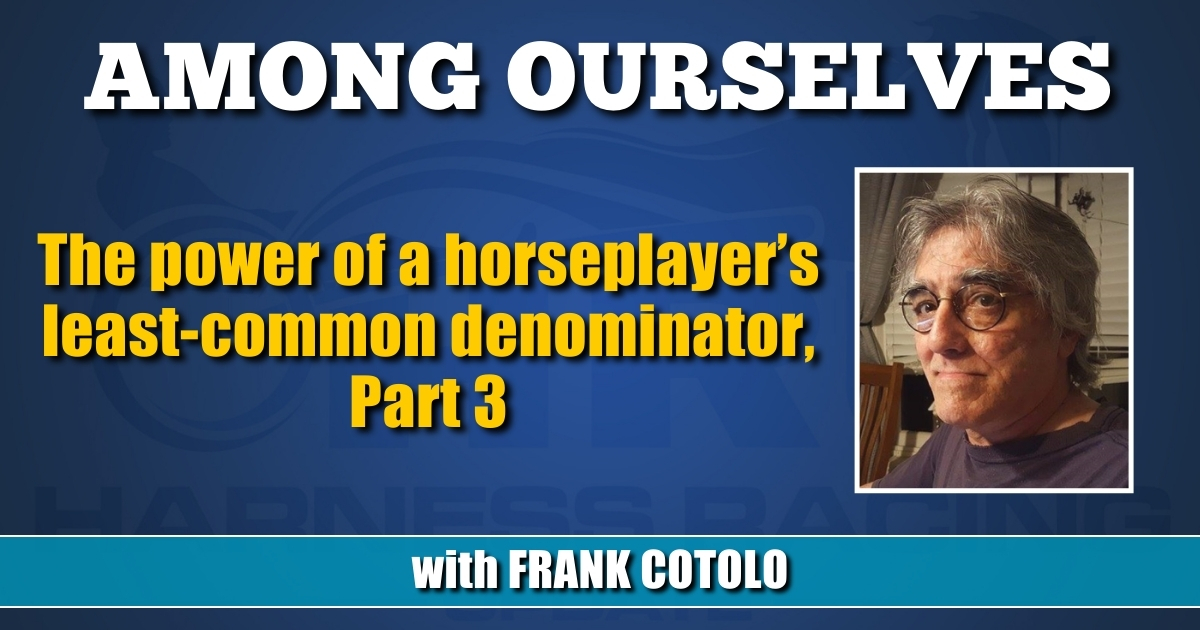Horse Racing
The power of a horseplayer’s least-common denominator, Part 3

by Frank Cotolo
No one expects a moment of epiphany. Yet it is in the nature of neuroscience for the human brain to experience a sudden wisdom; the kind needed to split an atom or at the least be able to tell David Copperfield how to rearrange the presidents’ heads on Mount Rushmore. When it happens either way the brain blooms. Dopamine dumps come in quarter notes. You are showered in Amazing Grace.
When I was hit with the power of a horseplayer’s least common denominator, I could not put it into words. Nor was I able to use an equation to create a mathematic definition. Let me explain the moment it struck me in the context of handicapping and betting on horse races. Then I will give full credit to the person — or should I say guru — who made me feel as if I was a caveman discovering fire.
Mark Cramer taught a class in handicapping horse races on the Los Angeles Community College grounds. Once in a while I joined him and we spoke to his class on the mornings before a Hollywood Park thoroughbred program. I made sure not to miss the particular class featuring a seminar by James Quinn.
His seminar was a rare public appearance. He was unlike others in my league of gentleman handicappers. Quinn was hard to find at the track. Though he dressed like the CEO of MetLife he was a loner. I only met with him twice and both times in the presence of Cramer. Though I saw him about the tracks now and then I never approached him alone because I respected his privacy as well as I had nothing more in common with him — as I did with Cramer and Meadow — than pari-mutuel play.
Quinn’s books are delicious. In them he covers simple and intricate methodology. One critic wrote he “demystifies the handicapping process.” For me his message was more dynamic than demystifying and during the seminar it came down to one simple product of the human mind. He was clear about many simple things important to a novice horseplayer, the audience of the seminar. But one generic definition was an epiphany for me and it made me want to jitterbug.
“Does anyone know the three elements that make a person an expert in anything?” Quinn said.
Responses were many but no one hit the motherlode. I did not offer an answer because I was apt to respond with something more like a punch line than a surge of smartness. Then he revealed the answer:
1. Knowledge — The psychological result of perception and learning and reasoning.
2. Experience — Skills resulting from direct participation in events or activities.
3. Intuition — Instinctive understanding without the use of rational processes.
K A B O O M !
Intuition? Of course. None of the experts gave credit to instinct. Not in their books or in their math or in their computer programs. Each of the league’s eggheads taught the process of handicapping by ignoring any stitch of emotional input. They were repelled by any feeling that could not be expressed in a number.
Up until my moment of epiphany I thought they were correct in blocking notions and impressions and any emotive influence. But in the context of the other two elements making a person an expert in anything it was obvious to me that intuition contributed monstrous energy to the trio. It flavored the richness of the other two; it needed to be trusted in the same way an artist knows without thinking how to create a painting or a song or any skill. Without intuition there is only a linear explanation to anything. Without intuition the other two qualities have no depth.
Quinn also said, “How many times do you look at a race’s past performances and one horse jumps out at you?”
We’ve all had that sensation. Quinn says we all know sometimes the message in the strange emotion demands attention; it craves attention and stays with you while the brain explains other conscious reasoning.
I was sold on Quinn’s acknowledgment. It is the frog DNA completing the Jurassic Park dinosaur ingredient; it’s why d’Artagnan is not a Musketeer (there must only be three); it is “a common structural and thematic element.” Three wishes; Three Stooges; joke structure; little pigs; Wise Men; baseball bases… aspects of the human experience; and not numerology.
And I already knew it because the third element of expertise was cooked in all of my creative work. It kept me afloat and delivered the push I needed to craft a lyric or a sentence or a joke or anything else calling upon my knowledge and experience to partner closure. Recognizing it at last took me past the Rubicon; I was forever settled with irrevocable commitment.
And I began the process of profiting from wins and losses and embracing their common denominator. Results pending in Part 4.


)






